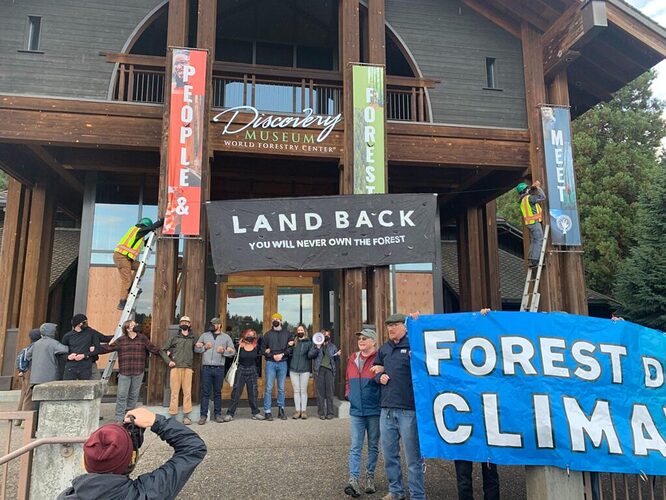An annual conference of international timber industry leaders will focus this week in Portland on the ownership and development of Northwest forests while protestors gather and hold their own conference on preserving them.
The industry conference, on Wednesday and Thursday, will feature panels on investments in private forests, with participants discussing everything from investments by international banks, timber companies and trusts to the future of private forest ownership and global markets for Northwest timber and wood products. It’s hosted by the 50-year-old nonprofit World Forestry Center in southwest Portland.
The conference has been held every year for more than two decades but this year, for the first time, it will face protests by more than two dozen environmental groups who oppose the corporate ownership and management of Oregon forests and what they say is the industry’s disproportionate contribution to global climate change. Environmentalists have planned a demonstration outside the World Forestry Center at noon on Wednesday, organized by the Pacific Northwest Forest Climate Alliance, which includes dozens of regional nonprofits such as Oregon Wild in Portland, Eugene-based Cascadia Wildlands and the Oregon chapter of the Sierra Club.
Alex Budd, an organizer for the alliance, said he’s expecting up to 200 people at the protest.
“Our forests can be a vital solution to the climate crisis right now,” Budd said. “We have a choice between how our forests are going to be managed, and whether they’re going to be managed to generate more shareholder profit for these Wall Street companies, or for the health and well being of our communities and the planet.”
Tyler Quinn, communications director for the World Forestry Center, declined an interview request via email but offered a statement about the planned protest.
“We envision a society that values and takes action to support forests’ economic, ecological and social benefits,” he said. “Our work is focused on welcoming more voices into the forestry conversation, and we support everyone’s right to express their opinion in public spaces, so long as they do so in a safe manner.”
Trees versus timber
The conference is sponsored by some of the largest timber and real estate holding companies in the world, including Weyerhaeuser, and will be attended by officials from large banks such as J.P Morgan as well as international conservation and land trust groups, such as The Nature Conservancy and Pacific Forest Trust.
On the agenda are discussions about growing interest from global investors in Northwest forests and the burgeoning international markets for wood products. Panels will also discuss the growing domestic and international markets for wood by-products that can be used to make biofuels. And they’ll cover the increased use of Northwest forests by fossil fuel and other companies to offset their greenhouse gas emissions levels.
Ben Jones, a spokesperson for the climate organization Seattle 350, part of the forest alliance, said carbon offset use appears to show that the industry is conservation-minded while extracting profits from forests.
“When it’s the same timber companies that are touting that they’re doing stuff with green energy or clean energy — with carbon offsets, with biomass — those are false solutions,” Jones said. “Those are not doing anything about the real problem, which is the continued destruction of ecosystems. We think that forests themselves have intrinsic value, and all of the goals of a clean energy transition involve having intact native and mature forests.”
According to a study published by researchers at Oregon State University and the University of Idaho in 2018, Oregon’s Coast Range forests are among the best in the world at absorbing and storing carbon, including up to 70% of the state’s overall carbon emissions between 2011 and 2015. The $7 billion per-year wood products industry, on the other hand, is the largest contributor to the state’s overall carbon emissions, the study found.
The industry generates more emissions than transportation or electricity and energy generation in the state, according to a 2017 report from the state Global Warming Commission. This is due to emissions from logging equipment, timber transport, milling and the carbon dioxide released from cut and decomposing trees.
Counter conference
The forest climate alliance will hold a counter conference on Thursday in Portland, two miles from the World Forestry Center at the First Unitarian Church of Portland called “Forests Over Profits.” There, according to Budd, experts will discuss sustainable forest management and indigenous forest and ecosystem management and preservation.
Among the speakers will be Thomas Joseph, of the Indigenous Environmental Network, who will discuss issues with selling portions of private Northwest forests for carbon offsets and the global market for carbon credits.
He called the market a scam, saying there’s little oversight and accountability, and that offsets do nothing to stop companies from emitting greenhouse gases.
“It’s a way to allow investors to put a price tag on our Mother Earth, to continue to commodify her,” he said. “We need to reduce emissions at the source, which means keeping fossil fuels in the ground and not thinking of market mechanisms or schemes for how we can just continue to capitalize on our forests.”
